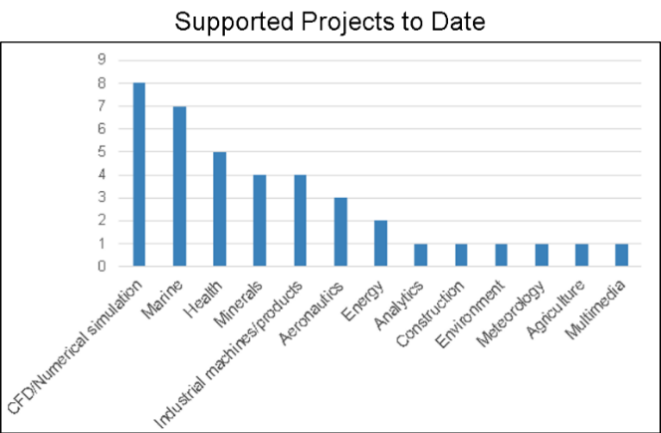Helping European SMBs Take HPC Leap

(koya979/Shutterstock)
Most enterprise-level organizations and advanced research institutions understand the benefits of HPC technology. Engineering, industrial design, AI, deep learning, autonomous driving, and many other fields require shortened R&D cycles and quicker time to market for goods and services that stimulate business growth.
But what about small- and medium-sized businesses (SMBs)?
The Partnership for Advanced Computing in Europe (PRACE) has expanded its original mission to address the cost and technical challenges for SMBs (definition: European companies ranging from one to 255 employees) interested in HPC, initiating the SME HPC Adoption Program in Europe (SHAPE). It delivers technical support to those businesses wishing to sample or experiment with HPC, without any associated risk.
Paul Graham, Software Architect at EPCC at the University of Edinburgh, and SHAPE Coordinator, described the challenges SMBs face. “Many small and medium businesses could take advantage of HPC but are unable to because of cost, materials, or expertise needed. Through SHAPE, we can remove these barriers and help them transform their business with HPC today.”
 A government-sponsored program spanning 25 European member countries, PRACE supports researchers and enterprises with some of the world’s most advanced HPC systems. For example, Cineca’s 20 petaFLOPS Marconi system, or the MareNostrum4 13.7 petaFLOPS system in the Barcelona Supercomputing Center, rank #14 and #16 respectively in the latest TOP500 list. Both systems take advantage of the most recent HPC technologies, such as Intel Xeon Scalable processors and Intel Omni-Path Architecture fabric.
A government-sponsored program spanning 25 European member countries, PRACE supports researchers and enterprises with some of the world’s most advanced HPC systems. For example, Cineca’s 20 petaFLOPS Marconi system, or the MareNostrum4 13.7 petaFLOPS system in the Barcelona Supercomputing Center, rank #14 and #16 respectively in the latest TOP500 list. Both systems take advantage of the most recent HPC technologies, such as Intel Xeon Scalable processors and Intel Omni-Path Architecture fabric.
At no cost, SHAPE lets smaller companies evaluate, experiment and implement HPC. It offers access to a pool of hundreds of staff from across Europe’s supercomputing centers. “SHAPE is a free program, offering access to powerful HPC machines,” Graham said. “The only risk to a small or medium-sized business is the time invested in working with a PRACE expert. Our teammates listen carefully to an SMB’s business challenges and determine the best ways to help them apply HPC toward the desired results.”
As with the enterprise-level PRACE program, SMBs seeking support from SHAPE must apply through an online form. While the sixth call for applications closed last month, a seventh call will be announced later in the first half of 2018. A review panel of PRACE board members and the industrial advisory team then evaluates submissions.
“We receive many applications and must consider which ones to take on with our limited resources,” Graham said. “We offer priority to those projects where SHAPE can have the most immediate business impact, where we believe new job creation can take place, where there may be a country-wide economic benefit, and where there is potential for a greater societal good.”
Once selected, the company representatives are paired with a PRACE teammate to evaluate the best way to meet business needs. With PRACE teammates throughout Europe, the SHAPE team endeavors to partner the company with the nearest PRACE center when possible.
For example, one small company seeks to design and build lighter, stronger and more effective prosthetics. HPC technology helps simulate a multitude of designs to identify the most durable and user-friendly models, which can then be 3D printed at a much lower cost than traditional custom prosthetics. SHAPE fast-tracked the project not only because HPC technology could shorten design cycles, but also because of its potential benefit to so many individuals . “We love to work on projects like this,” said Graham. “We know the company’s products have the potential to help people around the world improve the quality of life they may have lost.”
In another SHAPE project, a Spanish company, Vortex-Bladeless, wished to develop an advanced wind power generator without blades to reduce maintenance challenges of conventional bladed generators used in remote and offshore areas with high winds. The goal was to create a new type of generator without bearings or gears, minimizing hands-on maintenance and extending the device’s longevity. With the help of SHAPE and HPC, simulations of Fluid-Structure Interaction (FSI) problems offered insights for scaled models of the Vortex-Bladeless device applicable to future products.
 SMBs may not need the supercomputing power of a large-scale system like Italy’s MareNostrum4, with thousands of Intel Xeon Scalable processors. “With SMBs, they do not usually require the power of Europe’s most powerful systems,” noted Graham. “Regularly, we find the HPC problem-solving power they need can be delivered by a desktop system, or even a laptop, with fast Intel processors. We evaluate each project’s needs carefully to identify the tools most appropriate for the job, and which can help them reduce the time required to solve complex problems. In many cases, SMBs can easily afford an in-house, small-scale system optimized for their unique workload. We help them identify the right hardware for the task at hand and optimize the code for greatest performance.”
SMBs may not need the supercomputing power of a large-scale system like Italy’s MareNostrum4, with thousands of Intel Xeon Scalable processors. “With SMBs, they do not usually require the power of Europe’s most powerful systems,” noted Graham. “Regularly, we find the HPC problem-solving power they need can be delivered by a desktop system, or even a laptop, with fast Intel processors. We evaluate each project’s needs carefully to identify the tools most appropriate for the job, and which can help them reduce the time required to solve complex problems. In many cases, SMBs can easily afford an in-house, small-scale system optimized for their unique workload. We help them identify the right hardware for the task at hand and optimize the code for greatest performance.”
For each project, a SHAPE teammate coordinated with the company representative to immerse themselves in the details of the workload parameters and the code enabling it. SHAPE members are not necessarily focused full-time on a single project. During the support process SHAPE teammates at PRACE help SMBs apply parallelization for the optimization of applications, chase down system bottlenecks, assist with testing and determine other ways to maximize the processing power of smaller systems.
For each completed project in partnership with SHAPE, the team creates a whitepaper about the solutions and benefits these companies are experiencing from the effort. In this way, other SMBs pondering the value of HPC can better understand real-world examples of the technology in action. Additionally, each SHAPE project is revisited in a year’s time to evaluate its longer-term effectiveness. The follow-up process helps the team at SHAPE tweak their approaches, and assist future SMBs with similar opportunities.
Asked about significant challenges of the SHAPE program, Graham said, “The biggest challenge for SHAPE is not a technical one. It is generating greater awareness of the program, so more SMBs know we are here to help them be more successful.”
According to Graham, SMBs in Italy and France are most aware of the program, and therefore represent a majority of SHAPE applicants in 2017. He joked that “Ultimately, we want to have so many people wishing to utilize SHAPE we have to turn them away. We exist to help others, and when they are successful our work is especially rewarding.”
For more about the SHAPE program.
Rob Johnson is the owner of Fine Tuning, LLC, Portland, OR, and a former consultant to a Fortune 25 technology company.










